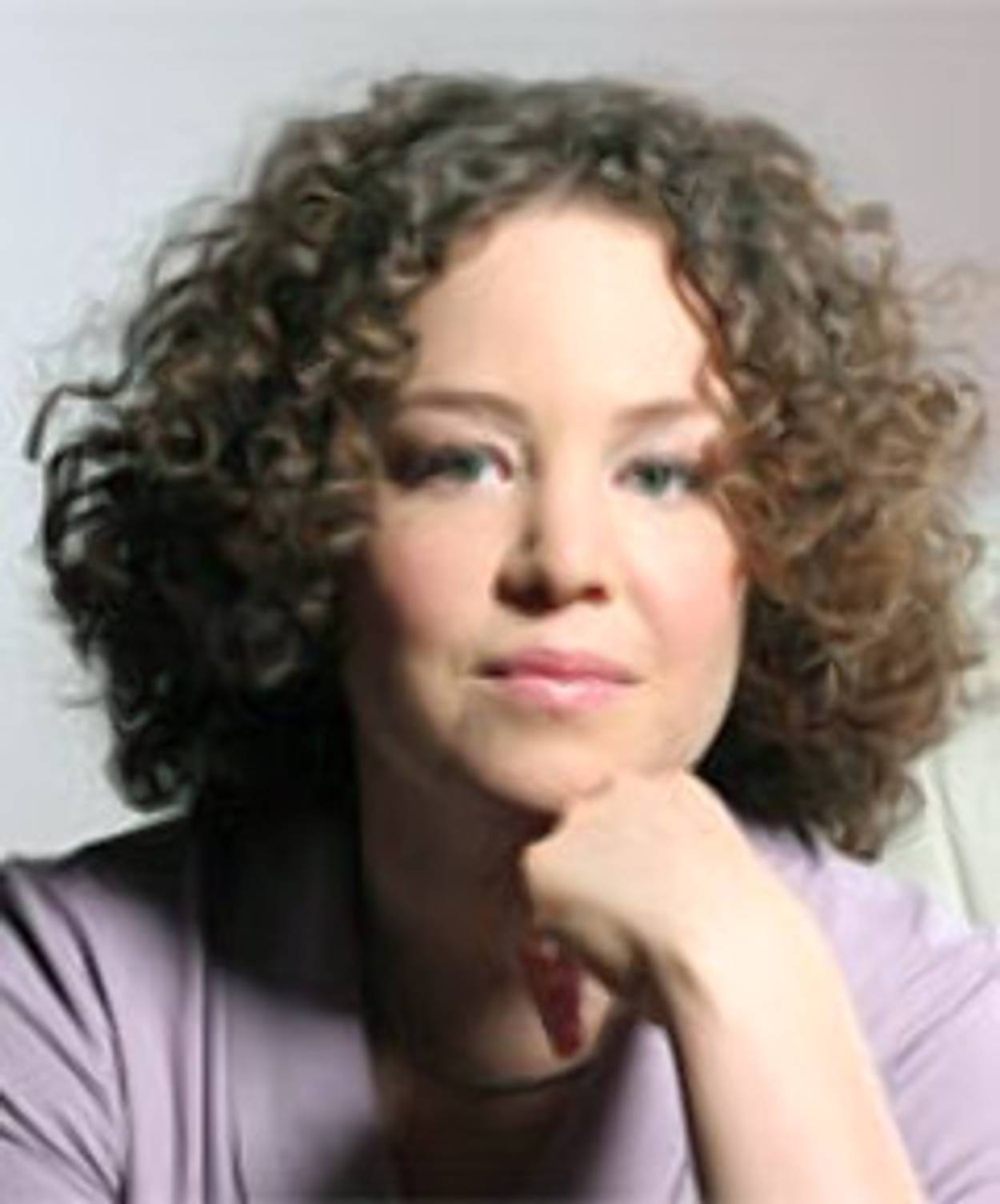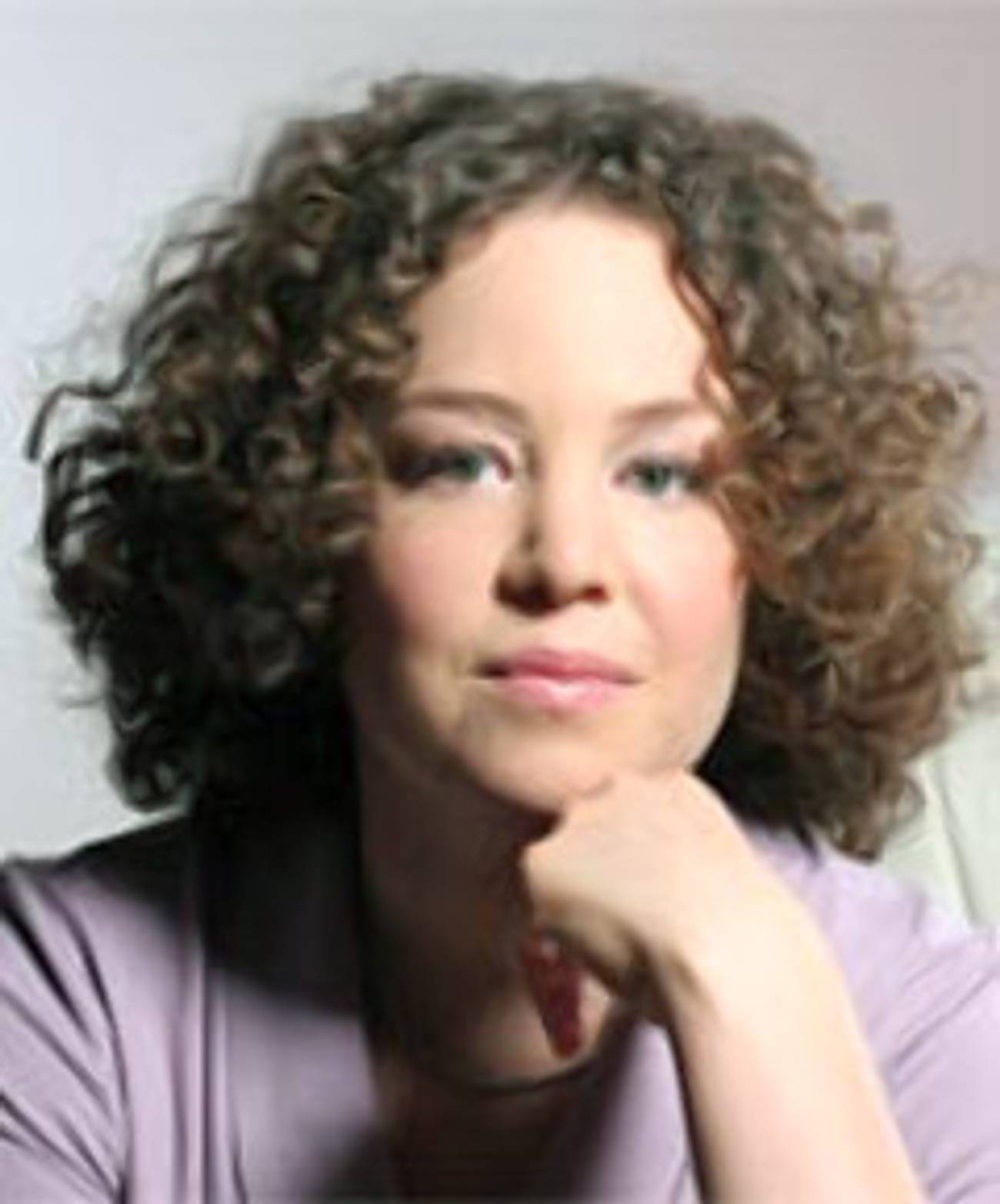Expatriate Act
Maya Arad breaks ground as an Israeli writer—by living in America




As a Hebrew writer living outside Israel, novelist Maya Arad is able to maintain a critical perspective on both her native culture and on the United States, where she has lived since 2002. Another Place, a Foreign City, her debut work and the first Hebrew novel written in verse, charts a love affair between a soldier in the Israeli army’s education corps and a Canadian immigrant. The book was a surprise bestseller in 2003, and she followed it up in 2005 with The Righteous Forsaken, a deft verse comedy which satirizes the stock characters of Israeli society, including a self-sacrificing state builder, a young leftist, and a high-tech millionaire.
In 2006, Arad—who teaches at Stanford—made a radical transition in content as well as form. Seven Moral Failings, a prose novel that depicts an academic job search at a prestigious American university, has few Israeli characters and touches only lightly on the themes of Israeli identity which dominate her earlier work. Earlier this year her collection of novellas, Family Pictures, was published in Israel. Set both there and in America, the stories survey the wreckage of a broken family through different lenses: the rivalries between half-siblings, a son’s romance with the daughter of his father’s girlfriend, and a divorced mother’s struggle to provide for her son.
Another Place, A Foreign City, was a groundbreaking book. What inspired you to write a novel in verse?
I was a student in England in 1994 when Vikram Seth’s A Suitable Boy came out. I asked a friend of mine who studied English literature who Seth was and what he had written. She said, “A Suitable Boy is okay, but you should really read his first book, The Golden Gate.”
So I read it and I was smitten. Then I read Eugene Onegin, in Hebrew. We always had it on the shelf at home—it is part of Hebrew culture—but I’m ashamed to say I only read it after I read Vikram Seth’s novel in verse. Eugene Onegin was a presence in Hebrew literature through the great translation of Abraham Shlonsky. Shlonsky really did it for amusement: Let’s see how this goes into Hebrew. And then, I felt that somebody had to take this simple story of boy meets girl and transfer it to the Hebrew milieu. This sounds strange, especially because I hadn’t written any fiction before that. I know it sounds crazy. What would you think if someone who had never written anything told you, “I want to write a novel in verse”?
When it came out, nothing happened critically. Everybody looked through it and said, “Oh, poetry.” Bookstores took one or two copies and put it on the top shelf in the corner where they put the poetry. Then, there was one very good critique by Menachem Ben in Zman Tel Aviv, and then another critique, and then more. By December it entered the Israeli best-seller list. It probably says something about Israel that a novel in verse can sell. I think it was the only novel in verse in history that was on any best-seller list.
You set the novel in the Israel of the early ’90s, a time of hopefulness and possibility. By the book’s end, though, the second Intifada has begun. Is the Israel you describe irrevocably gone? Has the Israeli identity exemplified by some characters also passed away?
Well, it’s gone in the sense that it’s past. If you want from me a manifesto a la A. B. Yehoshua about the chances for peace, you won’t get it. I always kept out of politics. Not because I don’t have political views. I do and they’re quite clear. But politics is made up of clichés all patched up together. And in writing I try to avoid clichés. Now, people did say to me about Another Place, “We’re confused! What do you have to say about Israeli identity?” Everybody picked on the fact that the heroine leaves Israel and I myself don’t live in Israel.
The book was about how we search for Israeli identity. How we’re eager to take answers from people we see as authoritative. It wasn’t like I wrote a work of fiction that discusses the deep philosophical and political question of Israeli identity. Really, I was trying to transfer Pushkin and his eighteenth-century ideal into the Israel of the late twentieth century.
Readers who responded to an interview with you which appeared on the Ynet news site condemned you for signing the writers’ petition against the recent war in Lebanon, and denounced you for “living happily abroad and telling us what to do.”
When I was shortlisted for the Sapir prize two years ago, some people complained that the committee was giving prize money to yordim. Nobody asked me about it, but, if they had, I would have said that the Sapir prize is for writing a Hebrew book, not a prize for colonizing the Negev or some other Zionist feat. Similarly, a journalist once asked me how I felt taking prize money from a writer in Sderot who has Qassam rockets landing on his or her head. I’m aware of the tension there. I never apply for the Prime Minister prize, for instance. I realize I don’t live there and part of that prize is living there. But as long as it’s just a prize for a Hebrew novel, I do write Hebrew novels and nobody can take this away from me.
Can you explain your use of that term, yored?
In Another Place, there is a very extreme and mocking portrait of the yoredet in the character of the protagonist’s aunt, who married a rich American Jew and speaks a hybrid language, half Hebrew and half English. That’s the trope of the yored. To me, though, a yored is an Israeli who chooses to live abroad, but he or she is still an Israeli. It is a name I have adopted. I won’t say that I’m proud of it, but at the same time I want to make sure that I don’t hide it.
Generally, its very hard for me to imagine what it would be like if I lived in Israel today. I left almost fourteen years ago, right after I finished my BA, in order to do a PhD in linguistics. I was never an adult in Israel, I never paid taxes, I never bought a house. So many of my life-forming experiences happened abroad.
I’m pretty convinced that I wouldn’t have started writing if I lived in Israel. Maybe it’s the experience of being cut off from everything which enables me to write. I worked on Another Place when I was in Geneva doing a postdoc. My husband was here in California at the time, so I had nobody to speak Hebrew to. If I hadn’t been writing those lines I wouldn’t have been practicing Hebrew. I’m able to see Israel from a different perspective being abroad.
There is a large community of Israelis who reside in America. How do you relate to that community?
I really love talking to audiences of Israelis abroad. In Israel, there’s always some tension around the fact that I live in America. I gave a talk to an audience of Israelis in Los Angeles a few years ago, and at some point they started talking about this tension. They said that whenever writers come from Israel they look down on them. I think they’re happy to see there’s a Hebrew writer who lives abroad. I’m happy to see that there are Israelis in the diaspora. It contributes something to the normalcy of Israelis to have a diaspora that speaks Hebrew and contributes to the culture.
You’re describing an Israeli diaspora that’s somehow discrete from the larger Jewish diaspora. How do you see the relation between those two diasporas?
Every Israeli who lives abroad is obligated to make novel choices: How are you going to relate to religion and Judaism? I grew up in an Israel which was very antireligious, so much so that I got married in England because I was so opposed to a religious ceremony. I still feel that way.
On the one hand I don’t want to be as antireligious as I was in Israel, and I definitely want my children to know something about religion. On the other hand, when I look at the alternative, when I look at American Judaism, whether the liberal trend or more conservative, it’s something that is so foreign to my culture. I can’t take my daughter to a Reform synagogue and show her that this is what her great-grandparents did. Secularization runs very deep in our family. I think the last person who was Orthodox was my great-great-grandfather. I’ll put it in an extreme way: I recently read a column in the Chronicle of Higher Education by an African American professor. He said that he feels he’s American; his roots are jazz, Martin Luther King. He said, though, that he feels pressured in his college to attend the Kwanzaa ceremony with traditional costumes. In the article he says, “This is not me.” American Jewish culture is completely different from Israeli culture. My identity is still much more Hebrew.
Seven Moral Failings is almost entirely disengaged from the questions of Israel and Israeli identity. Why did you decide to write a book so thoroughly located in the American milieu? Would it have been possible to set it in Israel?
The epigraph to Seven Moral Failings is taken from Yosef Haim Brenner, saying that Hebrew writers don’t have to write about life in Israel. We can write about human beings and love. Critics saw this, probably correctly, as a justification for writing a book in Hebrew that does not take place in Israel, and in which most characters are not Israeli. Some of them are Jewish, but it’s not a Jewish book, so to speak. Even if I had wanted to, I couldn’t have set the book in Israel because I needed to portray the sense of isolation of people who have no life apart from their academic work. It’s very hard to find this in Israel. Even people who are not married and don’t have a family have a circle of friends and family. So I really needed it to be set in the United States.
I like that this book is about life in the U.S., but is written in Hebrew. In that way it is similar to Brenner—most of his stories take place either in Russia or in London and were written in Hebrew. Shmuel Yosef Agnon as well: many of his characters lived in Eastern Europe and he writes in Hebrew. Brenner’s Hebrew represents conversations that probably took place in Yiddish or Russian, in the same way that I represent in Hebrew conversations that originally took place in English.
As a Hebrew writer in America, I think my America is more natural than that of novelists who write about America from Israel. It’s not like I’m boarding a plane. I am not the Israeli looking in with foreign eyes.
Samuel Thrope is a Jerusalem-based writer and the translator of Jalal Al-e Ahmad’s The Israeli Republic.